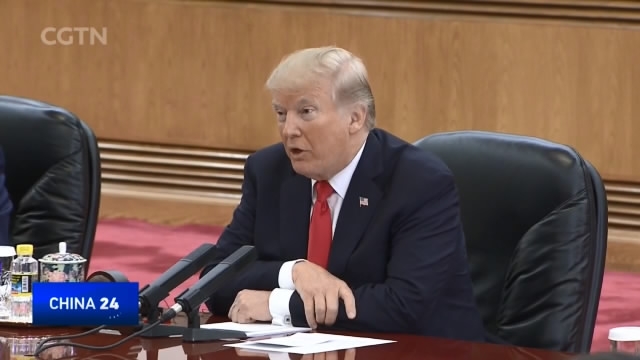
20:38, 20-Jan-2018
China-US Relations: Progress made but challenges remain

President Trump faced a series of challenges in the relationship between the US and China, such as the One-China policy, trade, and the South China Sea. Progress has been made, but the road has been rocky. Several American media outlets are reporting a series of actions on trade aimed at China. CGTN's Jim Spellman has more.
The US president Donald Trump came into office in January 2017, facing a series of challenges in the US-China relationship, from the One-China policy and trade to the DPRK and the south China sea. In February last year, the relationship between the two countries seemed to get off to a positive start. Trump sent a letter to President Xi Jinping wishing the Chinese people a happy new year. A phone call followed and Trump vowed to respect the "One China Policy".
LU KANG CHINESE FOREIGN MINISTRY SPOKESPERSON "Together, with the US, we will act in accordance with what the two presidents said in their phone conversation: enhance communication, expand cooperation and push for greater outcomes in the bilateral relationship for the benefit of both country's people and those around the world."
But in March, Trump lashed out on Twitter, saying China was not doing enough to solve the tensions on the Korean peninsula - a claim Trump would repeat throughout the year.
In April, Presidents Xi and Trump met for the first time at Trump's Mar-a-Lago estate in Florida. Both sides considered the meeting a success.
DONALD TRUMP US PRESIDENT "We've had a long discussion already, and so far I have gotten nothing, absolutely nothing, but we have developed a friendship, I can see that. And I think long term we're going to have a very, very great relationship and I look very much forward to it."
But in June, tensions flared again after the US moved forward with a 1.4 billion dollar arms deal to Taiwan. In early July, a US navy destroyer entered waters claimed by China in the South China Sea. President Xi sought to calm the situation in a call with Trump.
GENG SHUANG CHINESE FOREIGN MINISTRY SPOKESPERSON "President Xi pointed out that the two sides should stay committed to the general direction of China-US relations and focus on cooperation, adhere to the principle of mutual respect and mutual benefit, handle our differences properly, in order to enable our relationship to achieve positive outcomes."
In November, Trump visited China for the first time as president. The Chinese rolled out the red carpet. The trip included a tour to the Forbidden City. Trump and Xi used their meetings to build closer ties between the two nations.
DONALD TRUMP US PRESIDENT "There can be no more important subject than China-US relations. We have between us, and we have to include some other countries which would quickly come in, we have the capacity to solve world problems for many, many years to come."
During the trip, trade deals potentially worth 250 billion were announced.
But the China-US relationship under Trump has sometimes been viewed as two steps forward and one step back. For example, at APEC meetings in Vietnam, just a day after leaving Beijing, Trump lashed out at China for what he calls unfair trade practices, even as President Xi pushed for free trade and globalization.
XI JINPING CHINESE PRESIDENT "Globalization of the economy has brought important benefits to the development of the world economy, and has become an irreversible historical trend."
As the Trump presidency moves into its second year, tensions on the Korean Peninsula will likely remain an issue and several US media outlets are reporting that Trump is gearing up for a series of actions on trade aimed at China. Jim Spellman, CGTN, Washington.

SITEMAP
Copyright © 2018 CGTN. Beijing ICP prepared NO.16065310-3
Copyright © 2018 CGTN. Beijing ICP prepared NO.16065310-3